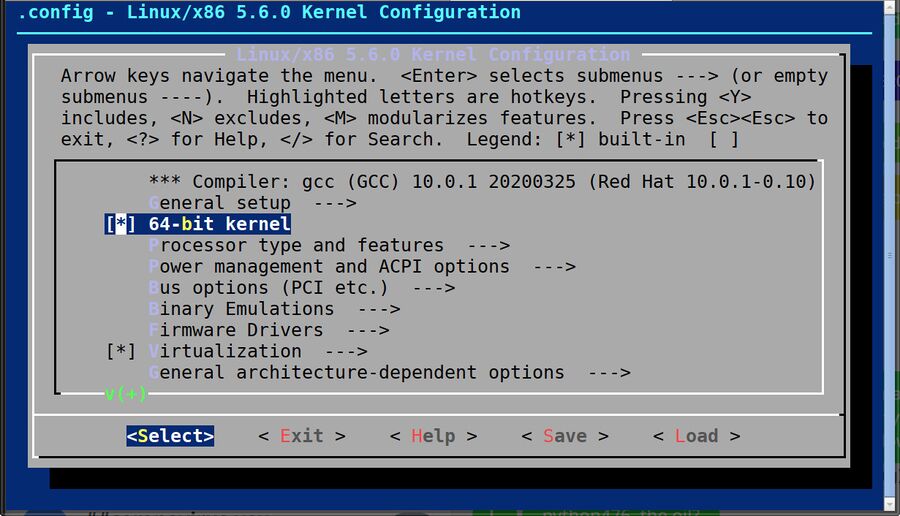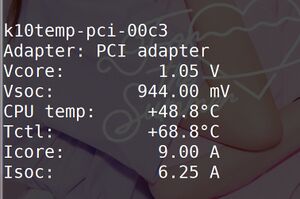Linux 5.6 Is Released
The latest kernel displays Vcore, Vsoc, Icore and Isoc power values on AMD chips using the k10temp hardware monitoring driver, there's multipath TCP (MPTCP) support, WireGuard network tunnel support for VPN connections, support for passing a configuration file with kernel options upon boot and much more. Intel WIFI support is broken in this kernel so you should avoid it if you are using a laptop or a notebook with a Intel WIFI chip.
written by 윤채경 (Yoon Chae-kyung) 2020-03-30 - last edited 2020-03-30. © CC BY

linux kernel 5.6: make menuconfig
Kernel 5.6 did not get its own name, the Makefile NAME = Kleptomaniac Octopus remains unchanged from the 5.5 release. That doesn't mean there isn't many exciting new features in this kernel release, there are. There is also a very unfortunate flaw for those using most Intel WIFI chips in this release.
 |
Warning: The iwlwifi wifi driver used by the vast majority of Intel wireless chips is broken due to a very unfortunate set of last-minute "fixes" between 5.6-rc7 and the final 5.6 release. You absolutely do NOT want this linux kernel version if you are (ab)using a Intel WIFI chips such as Intel(R) Dual Band Wireless AC 7265 or Intel(R) Dual Band Wireless AC 3160 because you won't be able to connect to access points using the iwlwifi driver in Linux 5.6.
This total scandal is caused by commit |
Linus Torvalds noted that the current global human malware situation has had little to no impact on kernel development in the 5-6 release announcement:
"So I'll admit to vacillating between doing this 5.6 release and doing another -rc.
This has a bit more changes than I'd like, but they are mostly from davem's networking fixes pulls, and David feels comfy with them. And I looked over the diff, and none of it looks scary. It's just slightly more than I'd have preferred at this stage - not doesn't really seem worth delaying a release over.
So about half the diff from the final week is network driver fixlets, and some minor core networking fixes. Another 20% is tooling - mostly bpf and netfilter selftests (but also some perf work).
The rest is "misc" - mostly random drivers (gpio, rdma, input) and DTS files. With a smattering of fixes elsewhere (a couple of afs fixes, some vm fixes, etc).
The shortlog is appended, nothing really looks all that exciting, and most of the discussions I've seen are already about things for the next merge window.
Which obviously opens now as of the release, and I'll start doing pulls tomorrow. I already have a couple of pull requests in pending in my inbox - thank you.
And while I haven't really seen any real sign of kernel development being impacted by all the coronavirus activity - I suspect a lot of us work from home even normally, and my daughter laughed at me and called me a "social distancing champ" the other day - it may be worth just mentioning: I think we're all reading the news and slightly distracted. I'm currently going by the assumption that we'll have a fairly normal 5.7 release, and there doesn't seem to be any signs saying otherwise, but hey, people may have better-than-usual reasons for missing the merge window. Let me know if you know of some subsystem that ends up being affected.
So we'll play it by ear and see what happens. It's not like the merge window is more important than your health, or the health of people around you.
Linus"
March 29th, 2020
Temperature and sensor readings is one small area where there has been two notable improvements in this kernel release. The k10temp hardware monitoring module for AMD processors has so far been limited to temperature readings. This module is now capable of showing Vcore, Vsoc, Icore and Isoc readings. There is also a new satatemp module, configurable with SENSORS_DRIVETEMP, for temperature readings from SSDs and HDDs. These temperatures were previously only available using special tools like smartctl. These temperature readings are much more readily available now that they are part of the standard hardware monitoring sub-system. It is, as an example, now possible to use fancontrol (from the lm_sensors package) to change fan speeds depending on harddrive temperatures.
A new CONFIG_MPTCP for "Multipath TCP (MPTCP) connections send and receive data over multiple subflows in order to utilize multiple network paths. Each subflow uses the TCP protocol, and TCP options carry header information for MPTCP." may be of interest to those doing very advanced network setups. The new CONFIG_ETHTOOL_NETLINK interface for ethtool may be more interesting to most network users, it has some new features like notification messages.
DMA engines for PLX ExpressLane PCI Switches is a more hardware-specific new feature in Linux 5.6. PLX ExpressLane PCI Switches are found on some very expensive high-end motherboards. You'll like this feature if your computer is worth more than your car.
Linux 5.6 is mostly fine on AMD and most Intel systems - except for most Intel laptops who randomly hang if the kernel is compiled with CONFIG_SATA_MOBILE_LPM_POLICY=3 (aggressive SATA power saving mode, Fedora and other distributions have kernel configurations set to 3). A workaround is to either compile the kernel with CONFIG_SATA_MOBILE_LPM_POLICY=1 or use the kernel command line option ahci.mobile_lpm_policy=1. A few low-powered Intel machines will also need intel_idle.max_cstate=1 i915.enable_dc=0 or they randomly hang. There is also a major problem with the iwlwifi driver for Intel wireless network cards in Linux 5.6 due to a very unfortunate last-minute "fix" between Linux 5.6-rc7 (where Intel wifi works) and the final 5.6 release. This affects a variety of Intel WIFI chipsets (AC 3160, AC 7265, likely more). You may want to avoid this kernel release if you have a laptop or notebook with a Intel wifi card and you would like to use that to connect to access points - because you won't be able to do that using the iwlwifi driver in Linux 5.6. Other wireless network devices, like Qualcomm Atheros devices, work appear to work fine with Linux 5.6.
linux-5.6.tar.xz can be acquired from kernel.org.



Enable comment auto-refresher